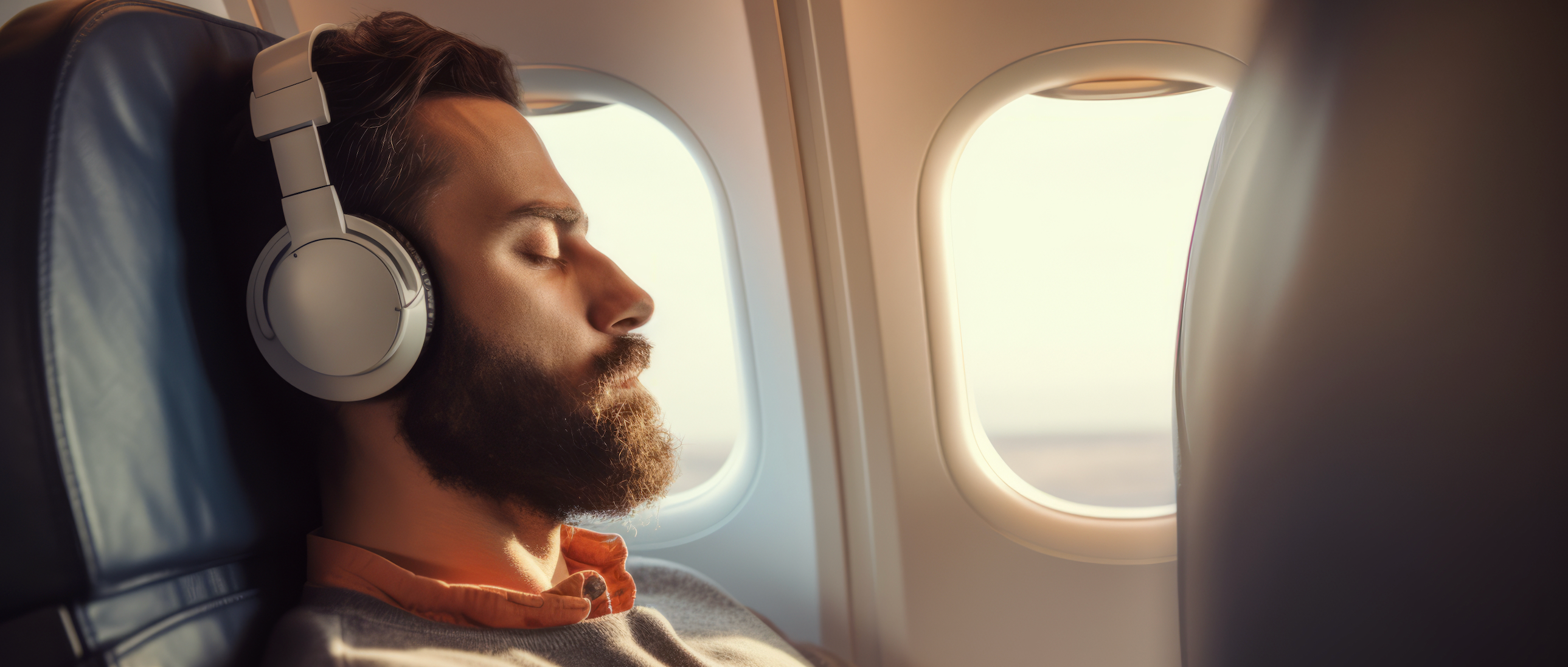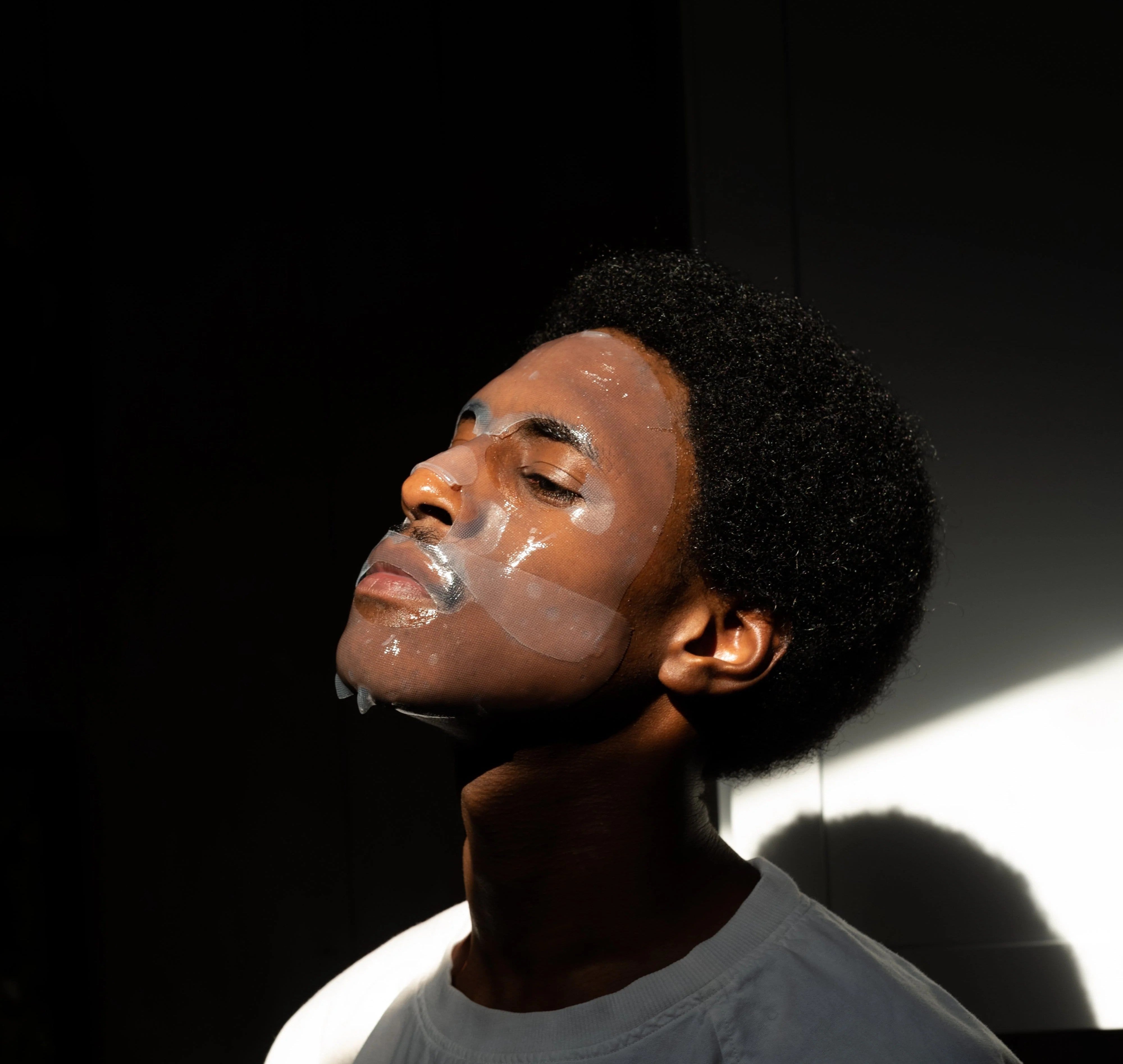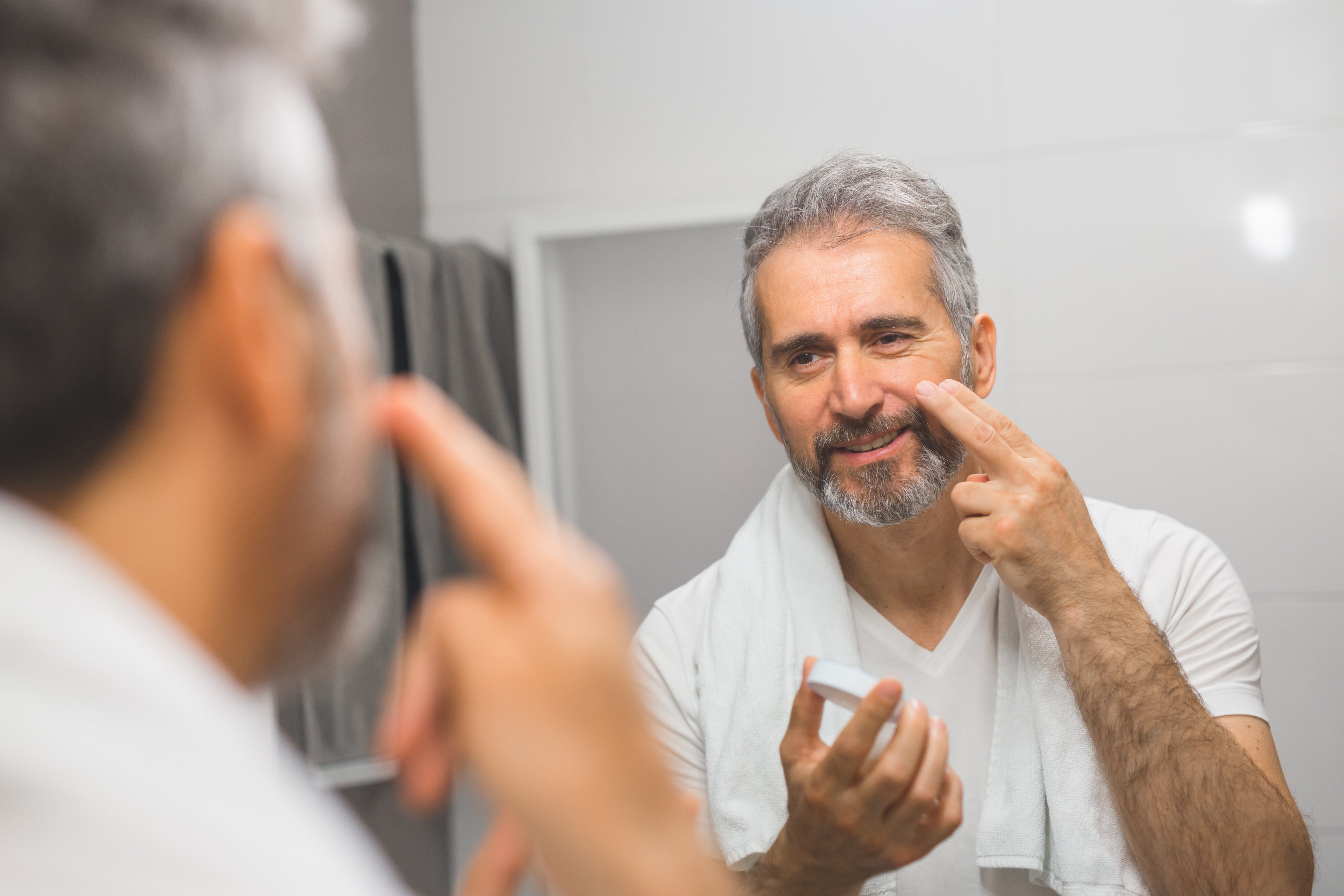
Your No-Nonsense Guide to Men's Skincare for Jet Lag
That red-eye might have saved you travel time, but the toll it takes on your skin? That’s a whole other story. Jet lag isn’t just about feeling groggy and out of sync; it throws your entire system for a loop, and your skin, being the largest organ, often bears the brunt. Dryness, dullness, breakouts, puffy eyes – sound familiar, globetrotter?
Don’t resign yourself to looking like you’ve wrestled a week's worth of layovers. Just like you strategize your meetings and pack your essentials, you can develop a simple yet effective skincare game plan to combat the dreaded jet lag face. This isn't about elaborate rituals in tiny airplane bathrooms; it's about smart, targeted steps to keep your skin healthy and resilient, no matter how many time zones you cross.
The Science of Skin Shock: How Jet Lag Messes with Your Face
To effectively fight back, it helps to understand why jet lag hits your skin so hard:
-
Disrupted Circadian Rhythm: Your body's natural sleep-wake cycle governs a whole host of biological processes, including skin cell regeneration and repair. When this rhythm is thrown off by rapid time zone changes, these processes become disrupted, leading to dullness and a lack of vibrancy.
-
Dehydration on Steroids: Airplane cabins are notorious for their incredibly low humidity levels. This dry environment sucks the moisture right out of your skin, leaving it feeling tight, flaky, and more prone to fine lines. Jet lag can exacerbate this dehydration as your body struggles to regulate its internal balance.
-
Increased Cortisol Levels: The stress of travel, coupled with sleep deprivation from jet lag, can trigger an increase in cortisol, the stress hormone. Elevated cortisol can lead to inflammation, which can manifest as redness, breakouts, and increased sensitivity.
-
Reduced Oxygen Levels: The lower cabin pressure in airplanes can slightly reduce the oxygen levels in your blood, potentially leading to a dull complexion and under-eye circles.
-
Inflammation Nation: The combination of disrupted sleep, dehydration, and stress can create a perfect storm for inflammation throughout your body, including your skin. This can worsen existing skin conditions and contribute to puffiness.
-
Impaired Barrier Function: Your skin's natural barrier protects it from external aggressors and helps retain moisture. Jet lag can weaken this barrier, making your skin more susceptible to dryness, irritation, and breakouts.
Your Pre-Flight Prep: Laying the Groundwork for Healthy Travel Skin
Think of this as fortifying your defenses before the battle begins:
-
Hydrate Like You Mean It: Stay hydrated on your flight. Well-hydrated skin is more resilient to the drying effects of cabin air.
-
Simplify Your Routine: Avoid introducing new or potentially irritating products in the days leading up to your trip. Stick to your tried-and-true basics.
-
Focus on Moisture: Use a hydrating, skin barrier protecting moisturizer on your trip. Look for ingredients like hyaluronic acid and ceramides.

-
Gentle Exfoliation: A day or two before your flight, gently exfoliate to remove any dead skin cells that can hinder moisture absorption. Avoid harsh scrubs; opt for a gentle chemical exfoliant or enzyme-based product.
- Protect Your Barrier: Ensure your skin barrier is healthy and intact. Avoid over-cleansing or using harsh soaps that can strip your natural oils.
In-Flight Skincare: Your Mid-Air Maintenance Strategy
This is about damage control and keeping your skin as comfortable as possible during the journey:
-
Hydration Hero: Water, Water, Water: Continue to drink plenty of water throughout your flight. Avoid excessive alcohol and caffeine, as they can further dehydrate you.
-
The Hydrating Mist Savior: A travel-sized hydrating facial mist containing ingredients like thermal water or hyaluronic acid can be a lifesaver. Spritz it on your face every few hours to combat dryness.
-
The Power of the Serum: A lightweight, hydrating serum packed with hyaluronic acid or beta-glucan can provide a concentrated boost of moisture without feeling heavy. Apply it after misting.
- Eye Care is Key: The delicate skin around your eyes is particularly susceptible to dryness and puffiness. A hydrating eye cream or eye mask can help. Apply it during the flight.
-
Lip Service: Don't forget your lips! A hydrating lip balm will prevent them from becoming chapped and uncomfortable.
-
Consider Light Coverage Makeup: If you wear any facial coverage, consider going bare-faced or opting for a very light application to allow your skin to breathe.
-
Avoid Touching Your Face: Airplane cabins are breeding grounds for germs. Resist the urge to touch your face to prevent potential breakouts.
Your Post-Arrival Recovery: Helping Your Skin Adjust to the New Time Zone
This is where you help your skin catch up with your new surroundings:
Cleanse Your Face: Upon arrival, wash your face with a good cleanser to remove any airplane grime and buildup. Powder cleansers are especially great because they are lightweight and won’t leak.
-
Hydration, Hydration, Hydration: Re-up your moisture levels with a generous application of your hydrating serum and moisturizer. Look for ingredients that draw moisture in and help repair your skin barrier.
-
Eye De-Puffing Power: If you're experiencing puffy eyes, a cooling eye gel or eye mask can provide relief. Stick it in the minibar for extra cooling and de-puffing.
-
Sheet Mask SOS: A hydrating and soothing sheet mask can be a fantastic way to give your skin an intensive treatment upon arrival. Look for masks containing ingredients like hyaluronic acid, centella asiatica, or calming plant extracts.
-
Antioxidant Boost: Consider using a serum rich in antioxidants like Vitamin C or Vitamin E to help combat free radical damage and inflammation caused by travel stress.
-
Listen to Your Skin: Your skin might feel more sensitive than usual after flying. Avoid harsh exfoliants or potentially irritating ingredients until it has had a chance to recover.
-
Continue to Hydrate Internally: Keep drinking plenty of water to rehydrate your entire system.
-
Prioritize Sleep: While adjusting your sleep schedule takes time, aim for as much quality rest as possible to allow your body and skin to recover.
Key Skincare Ingredients for the Jet-Lagged Gentleman
Look for these powerhouse ingredients in your travel skincare arsenal:
-
Hyaluronic Acid: A moisture magnet that can hold many times its weight in water, providing intense hydration.
-
Ceramides: Lipids that help strengthen your skin's natural barrier, preventing moisture loss and protecting against irritants.
-
Glycerin: Another excellent humectant that attracts and retains moisture in the skin.
-
Antioxidants (Vitamin C, Vitamin E, Green Tea Extract): Help protect against free radical damage caused by environmental stressors and travel.
-
Soothing Ingredients (Aloe Vera, Centella Asiatica, Chamomile): Can help calm inflammation and reduce redness.
-
Peptides: Can support collagen production and improve skin firmness over time
Your Travel Skincare Kit: The Essentials
Keep a dedicated travel skincare kit packed with these essentials:
-
Travel-sized Gentle Cleanser
-
Travel-sized Hydrating Serum
-
Travel-sized Rich Moisturizer
-
Travel-sized Hydrating Eye Cream or Eye Masks
-
Hydrating Facial Mist
-
Lip Balm with SPF
-
A Few Hydrating Sheet Masks
-
Travel-sized Broad-Spectrum Sunscreen
Conquering the Clouds: Healthy Skin, Happy Travels
Jet lag might be an unavoidable part of crossing time zones, but its impact on your skin doesn't have to be. By understanding how travel affects your complexion and implementing a consistent pre-, during-, and post-flight skincare strategy, you can keep your skin hydrated, healthy, and looking its best, no matter where your travels take you. So, pack smart, stay hydrated, and give your skin the TLC it deserves – your refreshed face will thank you upon arrival.
Jet Lag Skincare for Men: Your Frequently Asked Questions
Q: Will jet lag definitely affect my skin? A: It's highly likely. The combination of cabin air, disrupted sleep, and stress takes a toll on most people's skin, though the severity can vary.
Q: Can I use my regular skincare products while traveling? A: Yes, absolutely. Just ensure they are in travel-friendly sizes (under 3.4 ounces/100 milliliters for carry-on) and focus on hydration and gentle formulas.
Q: Should I wear a face mask on the plane? A: A hydrating sheet mask during a long flight can be beneficial for locking in moisture and combating dryness. Just be mindful of your fellow passengers! Opt for a clear or less noticeable mask if you're concerned.
Q: How soon after arriving will my skin recover from jet lag? A: It varies depending on the length of your flight and how well you adhere to a recovery routine. Allow a few days to a week for your skin to fully readjust along with your sleep cycle.
Q: Are breakouts common with jet lag? A: Yes, the stress and hormonal fluctuations associated with jet lag can trigger breakouts in some individuals. Focus on gentle cleansing and avoid picking at any blemishes.
Q: What's the most important skincare step during travel? A: Consistent hydration, both internal (drinking water) and external (using moisturizers and mists), is paramount. Sunscreen is also crucial as you'll likely be exposed to different levels of UV radiation depending on your destination.
Q: Can I use too much moisturizer on a flight? A: Generally no. Airplane air is incredibly drying, so layering lightweight, hydrating products is usually beneficial.
Q: Should I exfoliate immediately after a long flight? A: It's best to give your skin a day or two to recover before exfoliating, especially if it feels sensitive or irritated. Focus on gentle hydration first.
Q: Are eye patches effective for jet lag puffiness? A: Yes, cooling and hydrating eye patches can help reduce puffiness and refresh tired-looking eyes after a flight.
Q: What if my skin feels extra sensitive after flying? A: Opt for very gentle, fragrance-free products. Avoid harsh ingredients like strong exfoliants or active retinoids until your skin calms down.
Jet Lag Skincare: The "What Not to Do" List
Avoiding these common pitfalls can significantly help your skin cope with jet lag:
-
Don't Skip Sunscreen: Even if your destination is cloudy, UV rays can still penetrate. Apply broad-spectrum sunscreen daily, especially after arriving in a new location with potentially different sun intensity.
-
Don't Over-Cleanse: While removing airplane grime is important, over-cleansing can strip your skin of its natural oils, exacerbating dryness and irritation. Stick to gentle cleansers.
-
Don't Introduce New Products Immediately: Your skin is already under stress. Introducing new or potentially irritating products right after a long flight is a recipe for disaster. Stick to your basics or well-tested travel-sized items.
-
Don't Rely Solely on Airplane Air: The recirculated air is incredibly drying. Don't assume it will hydrate your skin. Be proactive with your own hydration efforts (water and topical products).
-
Don't Forget Your Lips: The thin skin on your lips is highly susceptible to dehydration and chapping. Neglecting them will add to your overall travel-weary look.
-
Don't Pick at Breakouts: Travel stress can trigger breakouts. Picking will only lead to more inflammation, potential scarring, and prolong the healing process.
-
Don't Neglect Your Sleep (Even if it's Tricky): While adjusting to a new time zone is hard, prioritize sleep as much as possible. This is crucial for your skin's recovery and overall well-being.
-
Don't Assume Your Destination's Climate Won't Affect You: Whether you're going from a humid to a dry climate or vice versa, your skin will need time to adjust. Pay attention to how it feels and adapt your routine accordingly.
-
Don't Forget Internal Hydration: Topical products are important, but they work best when you're also hydrated from the inside out. Keep drinking water.
-
Don't Underestimate the Impact of Stress: Travel itself can be stressful. Try to incorporate relaxation techniques into your journey to minimize the negative effects on your skin.
By understanding the science behind jet lag's effect on your skin, implementing a proactive skincare routine before, during, and after your flight, and avoiding these common mistakes, you can significantly minimize the toll time zone changes take on your complexion and arrive looking and feeling more refreshed.
Shop Anti-Jetlag Travel Skincare
The Jaxon Lane Promise:
Our products are formulated with effective ingredients and designed to be easy to incorporate into your daily life. Consistency is key, so find a routine that works for you and stick with it. You might not stop time, but you can definitely help your skin age gracefully and feel damn good in the process.






